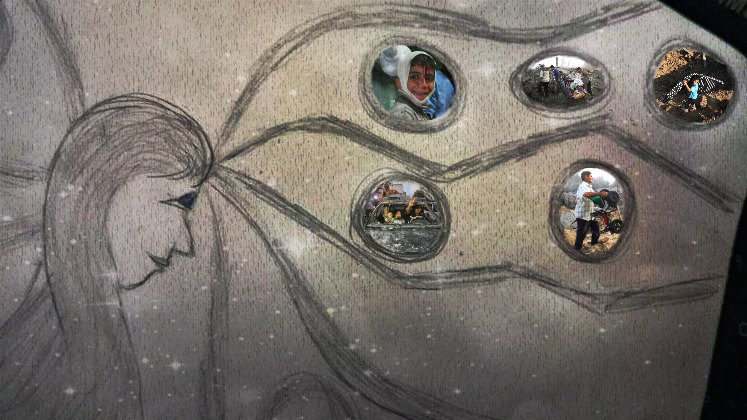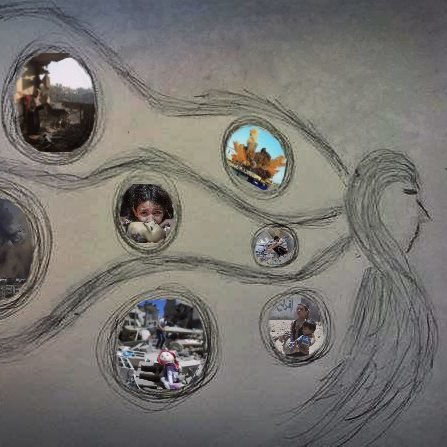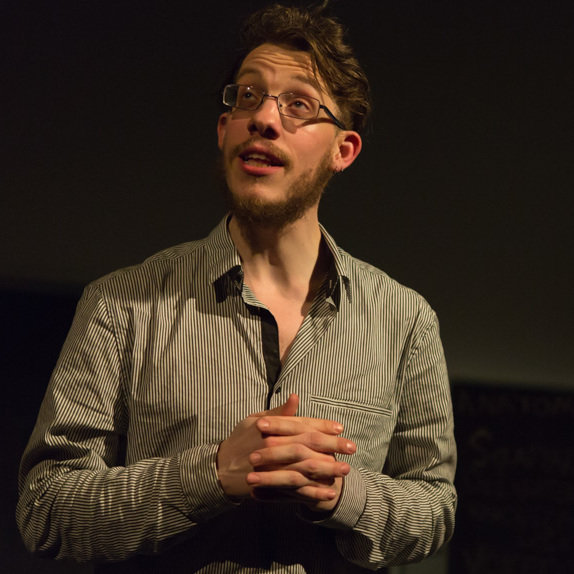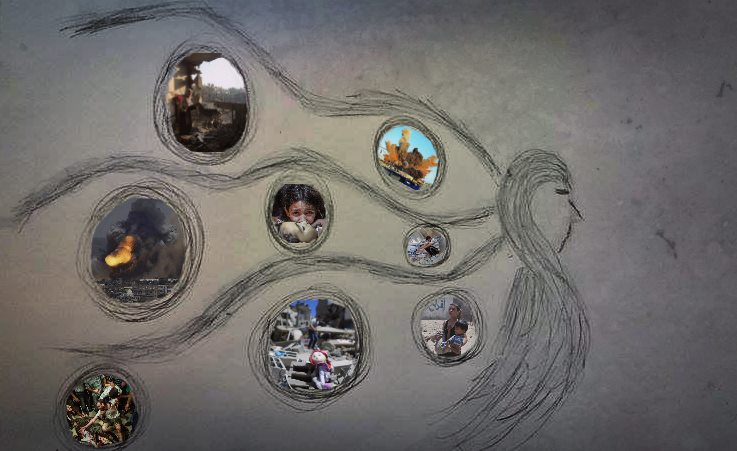
Here is another day added to my lifetime. I love mornings because they affirm to me that I have just escaped the past successfully, again. The sunlight, which was sneaking into my room through a hole in the ceiling, hit my eyes and forced them to open slightly.
I am lying still on my bed trying to remember what day it is when, suddenly, a deafening explosion shakes my bed and body. Intuitively, I stare at the ceiling for a short while, fearing it could fall and waiting for the next explosion. There it is again, shaking me this time to the very core.
I wake up from the slumber that had pulled me back. It was nothing but a nightmare, an endless repetition of a real-life horror story that I lived through during the war one year ago. You know you're in trouble when memories of your past turn into nightmares—and flashbacks when you’re awake.
I leave my room and see my mother preparing for lunch. Usually, at lunch time, my mother and I cook together, my father reads a newspaper or watches news on TV, my brother is at work and my little siblings play outdoors. However, during the war, the horrifying scenario of running away from shells or waiting for them to rain down replaced our daily habits.
At this particular time one year ago, it was our neighborhood's turn to take the brunt of Israeli aggression. Tanks targeted us nonstop all day long. Our neighbor's house was damaged, and shrapnel broke our windows; all we could do was hide in the kitchen in fear. The bombing caused the roof to crack, so we decided we'd better evacuate as soon as we could.
I used to believe that running away—from a relationship, one’s house, chores or school—was easy. But I couldn’t have been more wrong. At that moment, it was the hardest, most dangerous and most risky action we had ever taken. To leave your house in the midst of a bombardment, dodge shrapnel raining down all around you, and struggle to ignore your trembling body and focus on running as fast as possible until you reach a safe zone—to do all this in seconds would have been mind-boggling any other time.
However, holding hands all the way, we managed to safely reach a family friend's house just outside our neighborhood. We took a relieved breath, though we were completely aware of the fact that there was no safe place in Gaza during that assault, and we had escaped to somewhere only a little less dangerous.
Unsurprisingly, there were many families in our “safe house” who had escaped there for the same reason. I looked at the people's faces, and they were pale. Some of them gathered together and intensely debated the current situation, attracting more participants as the evening wore on. I noticed a family whose members were sitting closely by each other holding hands, two little girls who fell asleep in their mother's embrace, and a woman crying because she didn't know where her husband was and whether he was still alive or not. In the midst of such a diversity of feelings in a small house, I felt calmer. Misery, I believe, needs company.
One year has passed; our neighbor, whose home was partly damaged, got married three months ago in the same house. The relationship between us and my family friend, whose house shielded tens of people during the war, has become closer. It's been a year, but the same memory keeps haunting me whenever it's time for lunch. Despite the fear and sadness in it, I can't ignore the fact that it also showed me how steadfast my people are, and, no matter how hard it gets, we'll always stand by each other's side. And it helped me discover my hidden ability to run and dodge as fast and skillfully as football players!
It is now late afternoon. I can hear my little sisters and brother playing outdoors with the other kids. When my 3-year-old sister, Siba, comes into the house jumping joyfully and sits on the mat on the floor, the flashbacks start playing again in my head.
One year ago, Siba was lying in the same place with her legs pulled up to her chest, her hands hiding her face and her body shaking. That was the vulnerable reaction of a 3-year-old girl to the sound of bombs raining all around, which later on became something usual for more than a month. I tried to react like a mature 20-year-old, and held her tightly in my arms so that she would feel safe. I gradually succeeded in calming her down; she felt safe while I looked for somewhere to keep us both more protected. Safety was not possible, which is something little kids should not have to understand.
I looked at Siba, now sleeping peacefully, and wondered whether she still remembers that day, and if she, like me, has constant flashbacks that erupt in nightmares.
Meanwhile, I think of my little cousins, Layan , 9, and Lama, 7, who lost their friends during the war. Whenever I visit and play with them, Layan tells me, "We used to play this game with Ibrahim and Asem and Eman, but they're dead now." And then Lama starts telling me the story of their death: "Their house was shelled by two F-16 missiles all of a sudden. Now we can't see them anymore."
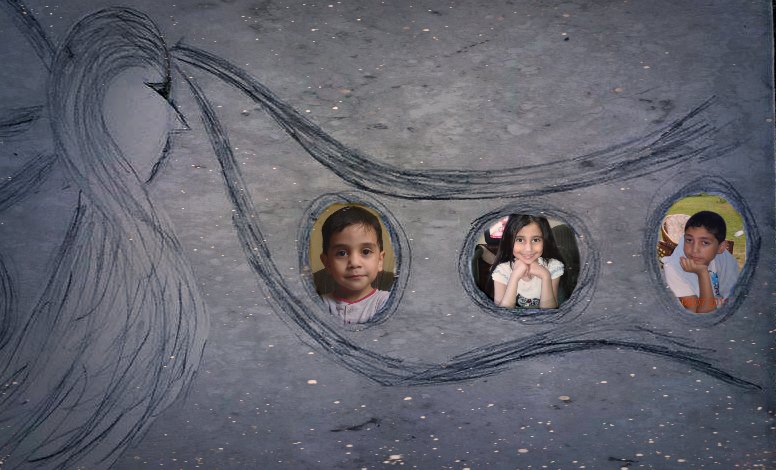
I'm not sure if Layan and Lama truly understand everything, but they do know that the last aggression has taken beloved people who will never come back again. Isn't it too early for such little souls to harbor memories of horror, loss and death? Aren't they supposed to be more carefree for a while? It's been a year, but my little siblings still hide in fear whenever they hear a warplane hovering in the sky and ask, "There isn't going to be a next war, is there?" My heart breaks into pieces when I realize that these kids are not children anymore; they have grown up so much so early.
Nonetheless, despite the suffering that constant wars have added to their lives, what you hear most from them is laughter. It's been a year, but our kids laugh loudly like they intend to for the whole world to hear them, like they know how to live each and every moment to the fullest until they give their last breath because they are aware of the fact that their lives could be stolen at any moment.
Night has descended now. I head to where I always welcome my days' beginnings and ends, my room, and look out at the view that was re-made by the assault: rubble!
Only a year ago, each family in the neighborhood used to gather by their front door and chat all night long. Our nights were charming and warm. But then, one night, it was like everything shuddered when Israeli warplanes shelled the Haroon family’s house, which is opposite mine. I heard the neighbors as they rushed to the demolished house to check for probable casualties. That was when we were first introduced to a new kind of lullaby that became routine in Gaza: the lullaby of the continuous bombings that merged our sleepless nights into our depressed mornings.
It's been a year, the rubble's still there, and my neighbors haven't gathered and chatted at night like they used to do. Fortunately, my nights now are free of fears I would wake up to a new massacre, to news about the increasing death toll, or to the expectation of having my house collapse over my head. However, something is missing: the last war has taken away the warmth I used to enjoy every night.
Hopefully, it won’t be forever.
